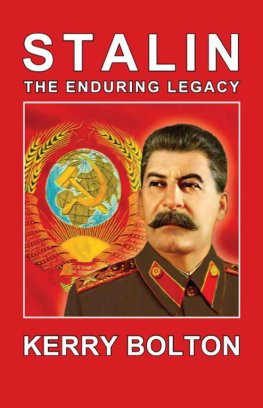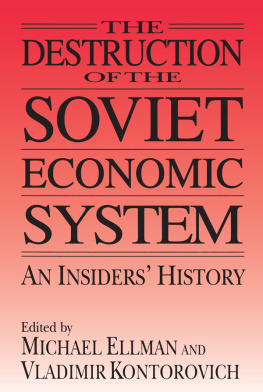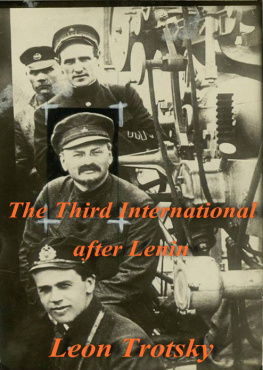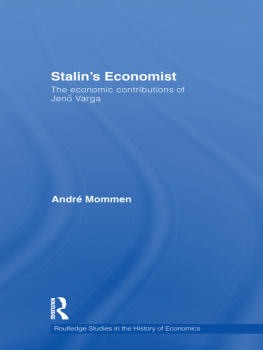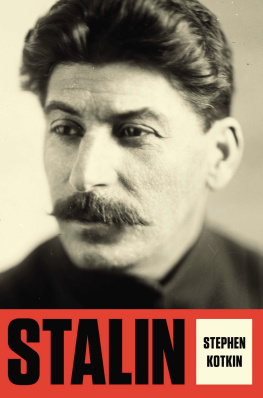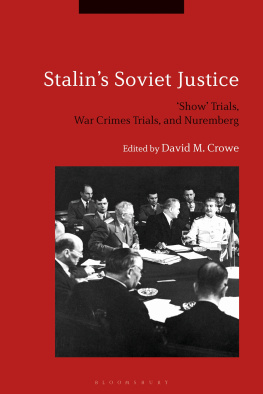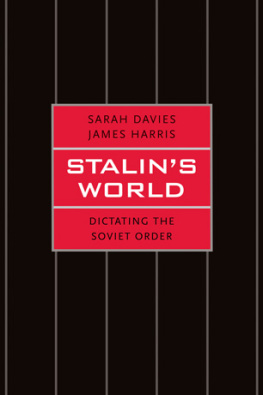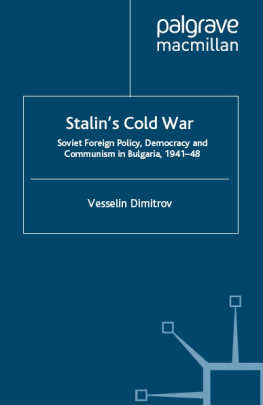Although he was the final arbiter of the fate of the Soviet people, Stalin culled information not only from subordinate leaders but also from his own think tank the Institute of World Economy, popularly known as the Varga Institute. In the first comprehensive study of the chief Soviet economist, Eugene Varga, historian Kyung Deok Roh shows that the moderate and reformist policies advocated by this Institute had a profound influence on the dictators foreign policy. Even when their views diverged, Stalin took Vargas undogmatic analyses of capitalism very seriously. Rohs deeply textured story demonstrates that even in the darkest days of Stalinist tyranny, divergent views were possible in discrete pockets of the Soviet intellectual apparatus as long as they did not stray from the broad contours of Marxist discourse.
Ronald Grigor Suny, William H. Sewell, Jr. Distinguished University Professor of History, University of Michigan, author of Red Flag Unfurled: History, Historians, and the Russian Revolution (2017)
Nothing was more important to Stalin and his circle than Marxism and nothing was more important to Marxism than global economics and politics. Thanks in part to the resourcefulness of the economist Eugene Varga, the Institute of World Economy and World Politics became the Soviet Unions go-to think tank on a wide range of issues. As this prodigiously researched book by Kyung Deok Roh clearly shows, Varga and his colleagues at the institute produced countless memos and articles that served as the intellectual nuts and bolts for Stalin and others at the highest echelons of power. Part economic history, part institutional history, and part political history, Stalins Economic Advisors furthers our understanding of how policy was made in the USSR and how Stalin made sense of what was happening in the world beyond the Soviet Unions borders.
Ethan Pollock, Associate Professor of History and Slavic Studies, Brown University
In this book, Ken Roh offers a masterclass on how to make intellectual history meaningful to the study of international politics. He dives beyond the surface Marxist rhetoric of Soviet-speak to clarify both the ideological development of Soviet thinking on international relations, and exactly what kinds of ideas actually guided Stalins thinking about the world. He achieves this through a deep institutional study of Vargas famous institute. The book overturns much received wisdom on Soviet history throughout its narrative, all while providing an exemplary research methodology for understanding how ideas become operationalized in foreign policy.
Oscar Sanchez-Sibony, Assistant Professor, The University of Hong Kong, author of Red Globalization
This clearly written and convincingly argued book is not just about economic advisors, but also foreign policy advisors who in many crucial aspects influenced Stalins understanding of and reactions to international problems. During the 1930s and 1940s, Vargas Institute of World Economics and Politics served as the key think tank that provided Soviet leadership with timely analyses of the global economic crisis and its effects in various capitalist countries, the resulting militarization and preparations for the war, fundamental reorganization caused by the wartime economic mobilization and planning, and the possibility of postwar crises. An old and fundamentally misleading academic tradition has interpreted Stalins foreign policy as resulting from either long-term geopolitical factors or ideological dogmas. Kyung Deok Rohs archival research demonstrates that the Soviet leader was relying on up-to-date empirical analyses and statistical monitoring of the global economic and political developments by a close-knit group of academic researchers. The results of this investigation will help revise some antiquated stereotypes about Soviet international policies during and around World War II.
Alexei Kojevnikov, Associate Professor of History, University of British Columbia
Library of Modern Russia
Advisory board
Jeffrey Brooks, Professor at Johns Hopkins University
Michael David-Fox, Professor at Georgetown University
Lucien Frary, Associate Professor at Rider University
James Harris, Senior Lecturer at the University of Leeds
Robert Hornsby, Lecturer at the University of Leeds
Ekaterina Pravilova, Professor of History at Princeton University
Geoffrey Swain, Emeritus Professor of Central and East European Studies at the University of Glasgow
Vera Tolz-Zilitinkevic, Sir William Mather Professor of Russian Studies at the University of Manchester
Vladislav Zubok, Professor of International History at the London School of Economics
Building on I.B.Tauris established record publishing Russian studies titles for both academic and general readers, the Library of Modern Russia will showcase the work of emerging and established writers who are setting new agendas in the field.
At a time when potentially dangerous misconceptions and misunderstandings about Russia abound, titles in the series will shed fresh light and nuance on Russian history. Volumes will take the idea of Russia in its broadest, cultural sense and cover the entirety of the multiethnic lands that made up imperial Russia and the Soviet Union. Ranging in chronological scope from the Romanovs to the present day, the books will foster a community of scholars and readers devoted to a sharper understanding of the Russian experience, past and present.
New and forthcoming
Building Stalinism: The Moscow Canal and the Creation of Soviet Space, Cynthia A. Ruder
Criminal Subculture in the Gulag: Prisoner Society in the Stalinist Labour Camps, Mark Vincent
Dissident Histories in the Soviet Union: From De-Stalinization to Perestroika, Barbara Martin
Fascism in Manchuria: The Soviet China Encounter in the 1930s, Susanne Hohler
Ideology and the Arts in the Soviet Union: The Establishment of Censorship and Control, Steven Richmond
Myth Making in the Soviet Union and Modern Russia: Remembering World War II in Brezhnevs Hero City, Vicky Davis
Nomads and Soviet Rule: Central Asia under Lenin and Stalin, Alun Thomas
Power and Conflict in Russias Borderlands: The Post-Soviet Geopolitics of Dispute Resolution, Helena Rytvuori-Apunen
Power and Politics in Modern Chechnya: Ramzan Kadyrov and the New Digital Authoritarianism, Karena Avedissian
Russia in the Time of Cholera: Disease under Romanovs and Soviets, John P. Davis
Russian Pilgrimage to the Holy Land: Piety and Travel from the Middle Ages to the Revolution, Nikolaos Chrissidis
Science City, Siberia: Akademgorodok and the Late Soviet Politics of Expertise, Ksenia Tartachenko
Soviet Americana: The Cultural History of Russian and Ukrainian Americanists, Sergei I. Zhuk
Stalins Economic Advisors: The Varga Institute and the Making of Soviet Foreign Policy, Kyung Deok Roh
The Communist Party in the Russian Civil War: A Political History,


